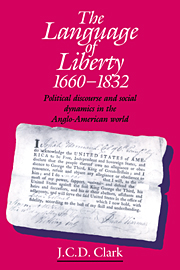 The Language of Liberty 1660–1832
The Language of Liberty 1660–1832 Book contents
- Frontmatter
- Contents
- Preface
- Acknowledgements
- List of abbreviations
- INTRODUCTION: THE STRUCTURE OF ANGLO-AMERICAN POLITICAL DISCOURSE
- 1 THE CONFLICT BETWEEN LAWS: SOVEREIGNTY AND STATE FORMATION IN THE UNITED KINGDOM AND THE UNITED STATES
- 2 THE CONFLICT BETWEEN DENOMINATIONS: THE RELIGIOUS IDENTITY OF EARLY-MODERN SOCIETIES
- 3 PREDISPOSITIONS: REBELLION AND ITS SOCIAL CONSTITUENCIES IN THE ENGLISH ATLANTIC EMPIRE, 1660–1832
- 4 POLITICAL MOBILISATION: THE AMERICAN REVOLUTION AS A WAR OF RELIGION
- CONCLUSION: ‘DESOLATING DEVASTATION’: THE ORIGINS OF ANGLO-AMERICAN DIVERGENCE
- Index
2 - THE CONFLICT BETWEEN DENOMINATIONS: THE RELIGIOUS IDENTITY OF EARLY-MODERN SOCIETIES
Published online by Cambridge University Press: 29 December 2009
- Frontmatter
- Contents
- Preface
- Acknowledgements
- List of abbreviations
- INTRODUCTION: THE STRUCTURE OF ANGLO-AMERICAN POLITICAL DISCOURSE
- 1 THE CONFLICT BETWEEN LAWS: SOVEREIGNTY AND STATE FORMATION IN THE UNITED KINGDOM AND THE UNITED STATES
- 2 THE CONFLICT BETWEEN DENOMINATIONS: THE RELIGIOUS IDENTITY OF EARLY-MODERN SOCIETIES
- 3 PREDISPOSITIONS: REBELLION AND ITS SOCIAL CONSTITUENCIES IN THE ENGLISH ATLANTIC EMPIRE, 1660–1832
- 4 POLITICAL MOBILISATION: THE AMERICAN REVOLUTION AS A WAR OF RELIGION
- CONCLUSION: ‘DESOLATING DEVASTATION’: THE ORIGINS OF ANGLO-AMERICAN DIVERGENCE
- Index
Summary
BEFORE REDEFINITION: POLITICS AND RELIGION IN THE OLD SOCIETY
If national identity in early-modern societies was determined by the modes of discourse hegemonic within them, eighteenth-century England had few powerful alternatives to its Anglican, monarchical self-image. It has rightly been observed that ‘there existed from before 1662 until sometime after 1800 a coherent and widely accepted body of establishment social theory rooted in catholic ecclesiology, ultimately biblical in origin, transmitted unimpaired to the post-Reformation Church of England, and expressed most authoritatively in the Book of Common Prayer’. The centrality of the hierarchical and hereditary ethos and of the Anglican clergy have led historians to characterise eighteenth-century England as an ‘ancien régime’ and ‘a confessional state’. It was a social formation which proved consistent with, indeed was reinforced by, growing agrarian and commercial prosperity, a proliferating print culture, the development of state bureaucracies and military power; but in respect of political languages, few inconsistent alternatives to this hegemonic discourse of the Anglican, monarchical, hereditary order were available.
The discourse of commercial prosperity did not originate or proliferate in the 1760s. It was already an old one, and had proved remarkably consistent with other discourses: the merchant community was royalist and republican, Christian and Jew, Anglican and Dissenter, English, Dutch and Huguenot. The discourses of ancient constitutionalism and natural rights were similarly employed by every interest group, though used in different ways by each: all sides successfully sought to use the catch-words of the day. The discourses which proved most resistant to this appropriation by established authority were, of course, denominational; and in that respect colonial societies differed most profoundly both from each other and from their mother country.
- Type
- Chapter
- Information
- The Language of Liberty 1660–1832Political Discourse and Social Dynamics in the Anglo-American World, 1660–1832, pp. 141 - 217Publisher: Cambridge University PressPrint publication year: 1993


